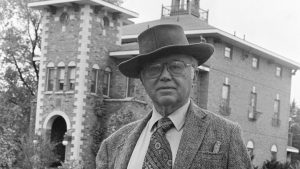Matthew Continetti at The Atlantic:

The Conservative Mind has provided generations of conservatives a sense of history and point of view. Where before conservatives had felt isolated, on the margins of political and cultural debate, they now could take their place in a great chain of thinkers, beginning in the modern era with Edmund Burke and continuing to the present. Kirk’s gallery of heroes was as idiosyncratic as his personality, grouping Brits with Americans, reactionaries with reformers, Confederates with Yankees. His chapters on John Randolph and John Calhoun, defenders of the slave power, discomfit contemporary readers, yet he also greatly admired Abraham Lincoln. Kirk was as critical of capitalism—he reminded audiences that it was a Marxist term—as he was of socialism. As he put it later: “The intellectual heirs of Burke, and the conservative interest generally, did battle on two fronts: against the successors of the Jacobins, with their ‘armed doctrine’; and against the economists of Manchester, with their reliance upon the nexus of cash payment.”
more here.
